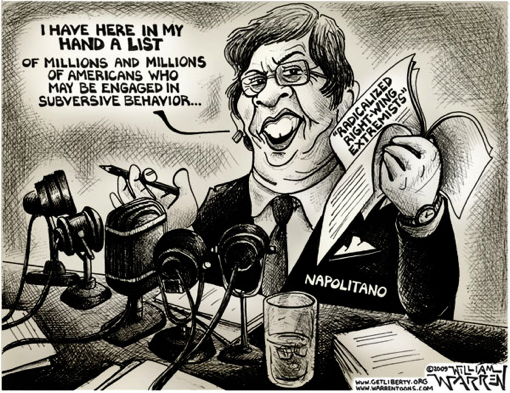The Southern Poverty Law Center (SPLC) and its co-founder Morris Dees, who was recently fired by the organization, have long and sleazy pasts. Over the years, they have been sharply criticized for their tactics, priorities, and mistreatment of employees.
Despite this, the federal government has regarded the SPLC as an expert on extremism and has a long history of coordinating with law enforcement at the federal and state level. SPLC sources were among those used to draft the Department of Homeland Security right-wing extremism memo in 2009.
The group also has a history of falsely smearing Christian and conservative organizations as Nazis and white supremacists that more than once prompted domestic terrorists to try and shoot up the Family Research Council and the 2017 GOP Congressional baseball practice. At one point, the Department of Homeland Security even gave the SPLC small contracts.
This is unacceptable. And to stop it, Congress must bar the SPLC from receiving any more federal funds and prohibit the government from ever working with the organization again, Americans for Limited Government President Rick Manning says.
“The SPLC derives its power from its involvement with the federal government through various law enforcement agencies, which they abuse by wildly and falsely attacking conservative and Christian groups and individuals under the guise of tolerance. The federal government needs to disassociate itself from this radical far-left agenda driven hate group. The federal government needs to stop legitimizing the SPLC’s research which is used by Silicon Valley,” Manning said.
Early in his career, Morris Dees worked on the campaign of a segregationist attorney general candidate and on a gubernatorial campaign of noted segregationist George Wallace. He also defended a Klan member who was accused of attacking people at a civil rights protest. Dees won the case, and the client’s bill was paid, in part, by the Ku Klux Klan.
In spite of this past, Dees ran the SPLC and pursued slam-dunk cases against the Klan winning huge verdicts for his clients. Unfortunately for SPLC’s clients, the Klan could not pay these large judgments so they only received a small portion of what they were owed. Of course, that did not matter to Dees and the SPLC. They wanted headlines and donations, and they got both. In the 1980s, the SPLC’s entire legal staff resigned in protest over the organization’s direction and Dees’ treatment of staff attorneys.
In the 1990s, the Montgomery Advertiser published a series of articles highlighting the SPLC’s problems. The investigation began after a stream of former SPLC employees told the Advertiser that the SPLC “was not what it appeared to be” and urged the newspaper to investigate. Among other things, the paper found that black SPLC workers “felt threatened and banded together.” A black former intern told the paper, “I think there’s a real question as to the sincerity and legitimacy of the organization because of the noticeable absence of blacks there… You know, it’s sort of like the pot calling the kettle black.” The Advertiser’s series on the SPLC was subsequently nominated for a Pulitzer Prize.
Over the past quarter century, there has been plenty of further criticism of Dees and the SPLC. For example, Harper’s published a letter in 2007 from civil rights attorney Stephen Bright. In the letter, Bright explained why he would be unable to attend the presentation of the “Morris Dees Justice Award.” His reason: “Morris Dees is a con man and fraud.” Bright went on to strongly criticize Dees’ fundraising methods.
“The positive contributions Dees has made to justice–most undertaken based upon calculations as to their publicity and fund raising potential–are far overshadowed by what Harper’s described as his “flagrantly misleading” solicitations for money. … He has taken advantage of naive, well-meaning people–some of moderate or low incomes…”
After Dees’ firing, a former SPLC staffer wrote in the New Yorker, “All the time, dark shadows hung over everything: the racial and gender disparities, the whispers about sexual harassment, the abuses that stemmed from the top-down management, and the guilt you couldn’t help feeling about the legions of donors who believed that their money was being used, faithfully and well, to do the Lord’s work in the heart of Dixie. We were part of the con, and we knew it.”
Several days after the publishing of the New Yorker article, Current Affairs published an article by a liberal author. The author looked into some of the groups included in the SPLC’s “hate map” and concluded that “it’s an outright fraud.” The map includes “groups” that appear to be defunct or are just individuals with bizarre or disgusting views. After researching the hate map and considering the organization’s fundraising and spending, the author concluded that, “To me, this is a scam bordering on criminal mail fraud.”
The following week, the Washington Post published an op-ed from the managing editor of the Advertiser at the time of its SPLC investigation. The former editor called for an investigation of the SPLC by the Internal Revenue Service and the Justice Department’s Civil Rights Division.
After years of running the organization as a plantation with few blacks in leadership positions, allegedly allowing the co-founder to sexually harass women and retaliating against those who complained, misleading the public and its donors about the threat of the Klan and other extremist organizations and falsely smearing opponents, the SPLC has no moral authority. It also has no business receiving a dime from taxpayers, and Congress should see to it that it does not and prohibit the federal government from ever coordinating with them again.
Richard McCarty is the Director of Research at Americans for Limited Government Foundation.







